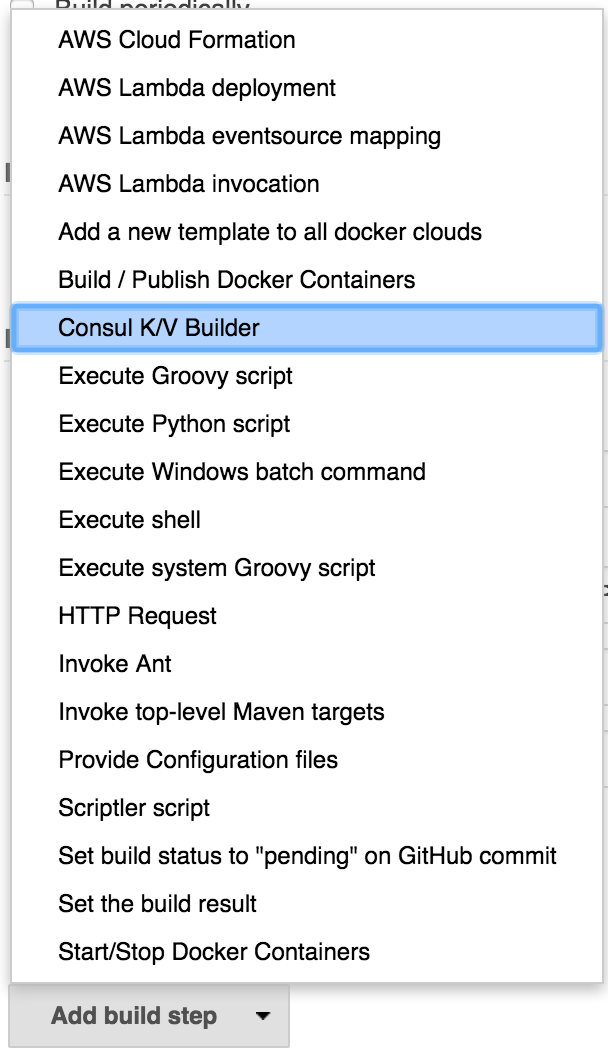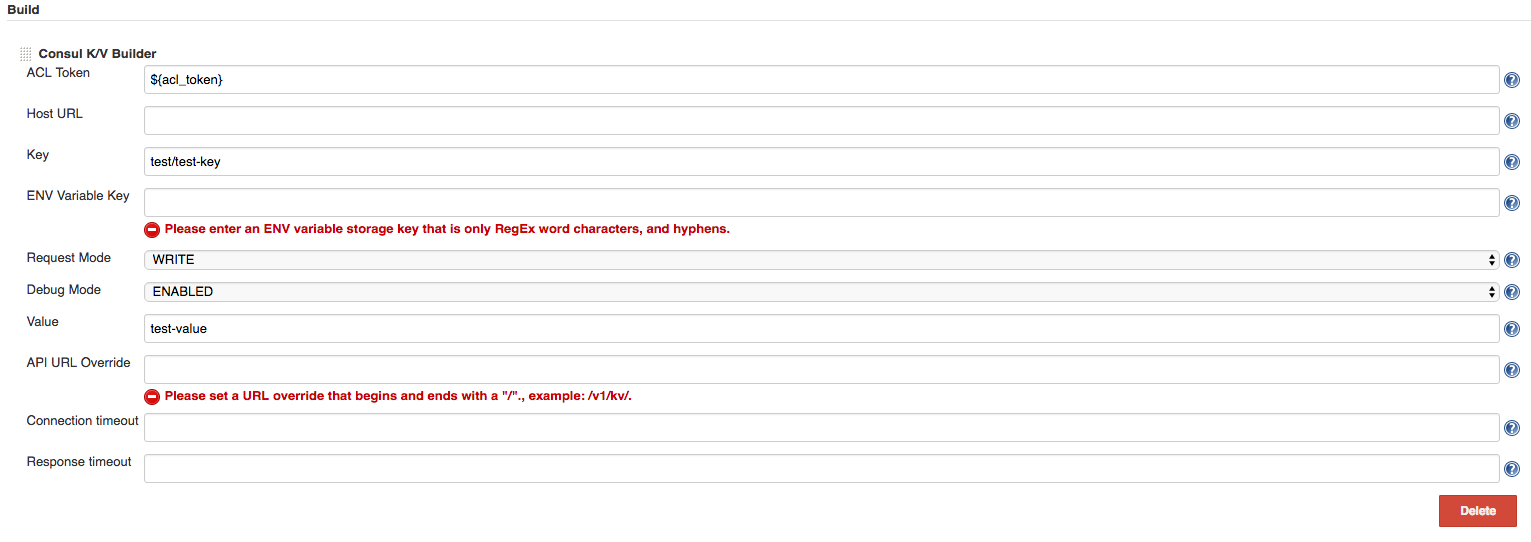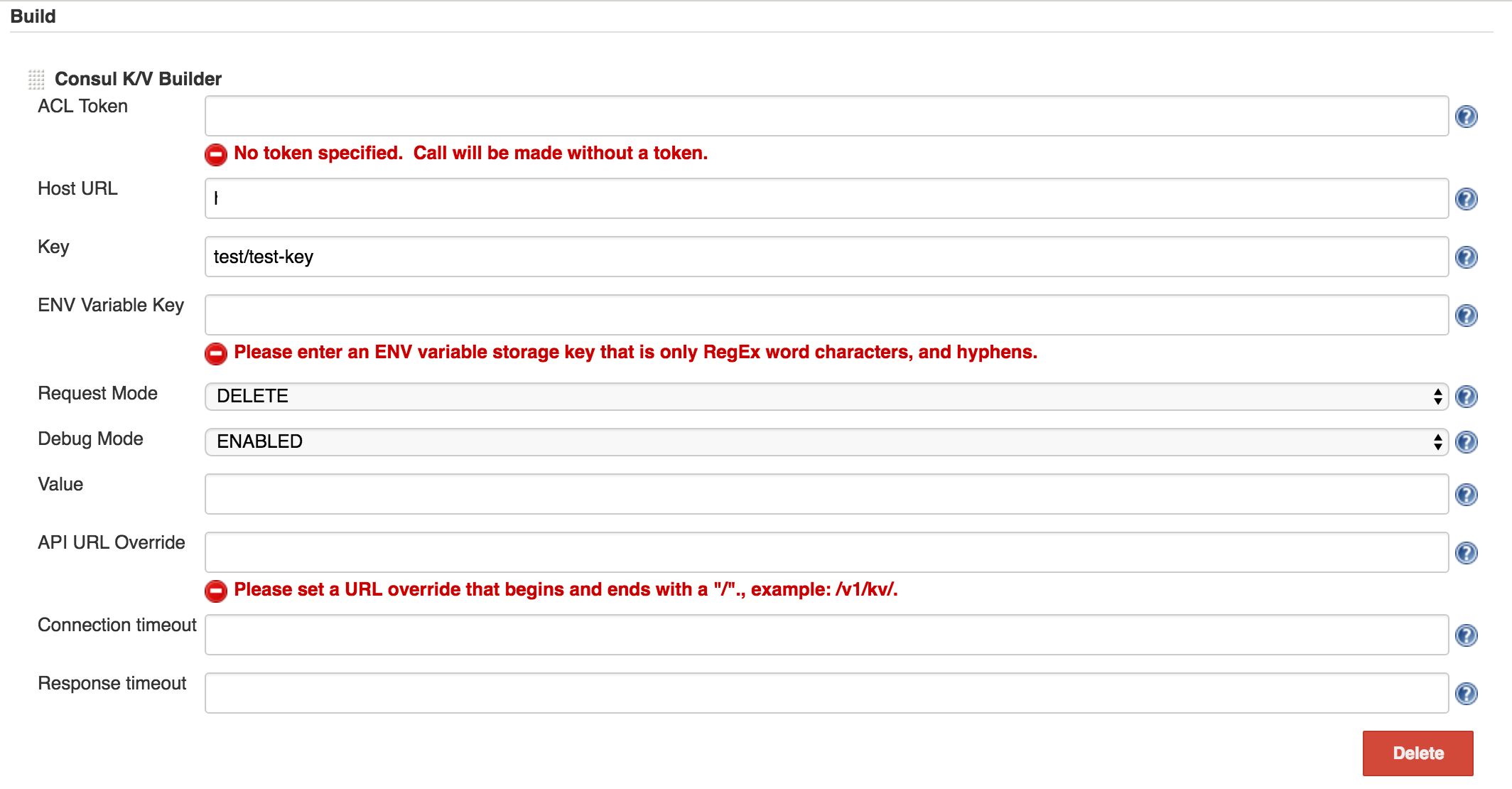Plugin Information |
|---|
View Consul KV Builder on the plugin site for more information. |
This plugin adds a new build step and build wrapper that are used to read/write/delete Key/Value data from/to specified HashiCorp Consul servers. or clusters.
Use Case
* You have a build that needs to read data from Consul Key/Value store and use those data later in the build or even in downstream parameterized builds.
* You have a build that needs to deploy, and part of that deployment is to configure Consul Key/Value settings.
Build Wrapper Usage
The Consul K/V Builder Plugin can be used as a Build Wrapper, so it is added to the project configuration by selecting under the "Build Environment" checkboxes. As a build wrapper, it can be added multiple times to read multiple Key/Value pairs.
Build Step Usage
The Consul K/V Builder Plugin can also be used as a Build Step, so it is added to the project configuration via the “Add Build Step” button towards the bottom of the project configuration window. As a build step, it can be added multiple times to read/write/delete multiple Key/Value pairs.
To read data from Consul, you configure the build step with the following settings:
Field name | Description |
|---|---|
ACL Token | optional, supplies the Consul ACL entry ID that is used to access data |
Host URL | URL of the Consul server/cluster |
Key | Key used to store and lookup data in Consul |
ENV Variable Key | Key used to store the data into a Jenkins build environment variable |
To write Consul data, you must expose the "Advanced" settings.
Field name | Description |
|---|---|
Request Mode | Set to write |
Debug Mode | Optionally enable debug mode for additional logging |
Value | Value to write to Consul with the specified key from above |
API URL Override | optional, used to specify the non-default URI for the Consul server RESTful HTTP API endpoints |
Connection timeout | optional, used to specify connection timeout, default is 10 seconds |
Response timeout | optional, used to specify response timeout, default is 30 seconds |
Handy Hint
This example shows the use of a build parameter acl_token
To delete Consul data, you must expose the "Advanced" settings, and choose delete.
Field name | Description |
|---|---|
Request Mode | Set to delete |
Debug Mode | Optionally enable debug mode for additional logging |
Value | N/A |
API URL Override | optional, used to specify the non-default URI for the Consul server RESTful HTTP API endpoints |
Connection timeout | optional, used to specify connection timeout, default is 10 seconds |
Response timeout | optional, used to specify response timeout, default is 30 seconds |
Pipeline Usage
This plugin can be used in Jenkins Pipeline scripts with "wrap" and "step" constructs:
Features
Build Wrapper
* Read Key/Value data from Consul server/cluster, write to ENV variable
Build Step
* Read Key/Value data from Consul server/cluster, write to ENV variable
* Write Key/Value data to Consul server/cluster
* Delete Key/Value data from Consul server/cluster
* Optional debug mode for additional logging
* Supports Consul ACL ids, including using build parameters for ACL ids
* Optional override Consul RESTful HTTP API URI
* Optional override connection timeout
* Optional override response timeout
Global Settings
* Set global settings that can be leveraged in jobs
Changelog
Version 1.0.6 (May 11 2016)
* Initial release
Version 2.0.4 (June 3 2016)
* Added Build Wrapper and Jenkins Pipeline compatibility
Version 2.0.7 (September 20 2016)
* Added build/run failure model settings
* Added listener error settings
Version 2.0.12 (October 3 2016)
* Added global Consul settings that can used/ignored at the job-config level
Version 2.0.13 (November 2 2016)
* Attempted to Fix issue: https://github.com/jenkinsci/consul-kv-builder-plugin/issues/5. Pipeline Steps implementing the SimpleBuildStep interface cannot write data to run-level environment variables.
The workaround may be to write a single-value custom step that returns a string, or use the wrapper to set a local var in the node.
node('master') {
TEST_KEY = ''
wrap([$class: 'ConsulKVReadWrapper', reads: [[aclToken: '', apiUri: '', debugMode: 'ENABLED', envKey: 'test_key', hostUrl: '', key: 'test/test-key']]]) {
echo env.test_key
TEST_KEY = env.test_key
}
echo TEST_KEY
}
//or for a global var:
import groovy.transform.Field
@Field String TEST_KEY
node('master') {
wrap([$class: 'ConsulKVReadWrapper', reads: [[aclToken: '', apiUri: '', debugMode: 'ENABLED', envKey: 'test_key', hostUrl: '', key: 'test/test-key']]]) {
echo env.test_key
TEST_KEY = env.test_key
}
echo TEST_KEY
}
node ('master') {
echo TEST_KEY
}
//Use Wrapper to get multiple key/values
node ('master') {
wrap([$class: 'ConsulKVReadWrapper', reads: [[aclToken: '', apiUri: '', debugMode: 'ENABLED', envKey: 'test_key', hostUrl: '', key: 'test/test-key'], [aclToken: '', apiUri: '', debugMode: 'ENABLED', envKey: 'test_key2', hostUrl: '', key: 'test/test-key'], [aclToken: '', apiUri: '', debugMode: 'ENABLED', envKey: 'test_key3', hostUrl: '', key: 'test/test-key']]]) {
echo env.test_key
echo env.test_key2
echo env.test_key3
}
}







